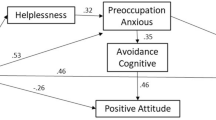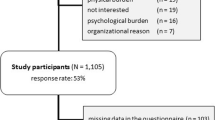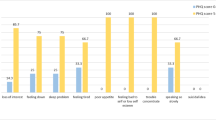Abstract
Introduction
Depression in cancer patients is prevalent and negatively impacts their quality of life. Likewise, it correlates with lower overall survival. The aim of this work is to analyze whether different coping strategies, as well as sociodemographic and clinical factors are associated with the presence of depressive symptoms in individuals with a resected, non-metastatic neoplasm about to initiate adjuvant chemotherapy.
Methods
NEOcoping is a cross-sectional, prospective, observational, multicenter study. Clinical (tumor site and stage, time to diagnosis, risk of recurrence, and type of adjuvant treatment) and sociodemographic characteristics (age, gender, marital status, educational level, occupational sector, and employment status), coping strategies (Mini-MAC scale), and depressive symptoms (BSI scale) were collected. A two-block linear regression model was performed to determine the predictive variables of depressive symptoms.
Results
524 adults with resected, non-metastatic cancer were recruited. Twenty-six percent of patients have clinically significant depressive symptoms. Being female, < 40 years of age, having breast and stomach cancer, and > 50% chance of recurrence were associated with increased risk of depression. Likewise, depression was associated with greater helplessness and anxious preoccupation, and less fighting spirit. Age, gender, and risk of recurrence accounted for only 7% of the variance in depressive symptoms. Including coping strategies in the regression analysis significantly increased the variance explained (48.5%).
Conclusion
Early psychological intervention in patients with maladaptive coping strategies may modulate the onset of depressive symptoms, especially in those at higher risk for depression.
Similar content being viewed by others
References
Mitchell AJ, Chan M, Bhatti H, Halton M, Grassi L, Johansen C, et al. Prevalence of depression, anxiety, and adjustment disorder in oncological, haematological, and palliative-care settings: a meta-analysis of 94 interview-based studies. Lancet Oncol. 2011;12(2):160–74.
Rieke K, Schmid KK, Lydiatt W, Houfek J, Boilesen E, Watanabe-Galloway S. Depression and survival in head and neck cancer patients. Oral Oncol. 2017;65:76–82.
Suppli NP, Johansen C, Kessing LV, Toender A, Kroman N, Ewertz M, et al. Survival after early-stage breast cancer of women previously treated for depression: a Nationwide Danish cohort study. J Clin Oncol. 2017;35(3):334–42.
Sullivan DR, Forsberg CW, Ganzini L, Au DH, Gould MK, Provenzale D, et al. Longitudinal changes in depression symptoms and survival among patients with lung cancer: a national cohort assessment. J Clin Oncol. 2016;34(33):3984–91.
Vodermaier A, Linden W, MacKenzie R, Greig D, Marshall C. Disease stage predicts post-diagnosis anxiety and depression only in some types of cancer. Br J Cancer. 2011;105(12):1814–7.
Xiao F, Song X, Chen Q, Dai Y, Xu R, Qiu C, et al. Effectiveness of psychological interventions on depression in patients after breast cancer surgery: a meta-analysis of randomized controlled trials. Clin Breast Cancer. 2017;17(3):171–9.
Okuyama T, Akechi T, Mackenzie L, Furukawa TA. Psychotherapy for depression among advanced, incurable cancer patients: a systematic review and meta-analysis. Cancer Treat Rev. 2017;56:16–27.
Reynolds CF, Thomas SB, Morse JQ, Anderson SJ, Albert S, Dew MA, et al. Early intervention to preempt major depression among older black and white adults. Psychiatr Serv. 2014;65(6):765–73.
Jimenez-Fonseca P, Calderón C, Hernández R, Ramón y Cajal T, Mut M, Ramchandani A, et al. Factors associated with anxiety and depression in cancer patients prior to initiating adjuvant therapy. Clin Transl Oncol. 2018;20(11):1408–15.
Ferrari M, Ripamonti CI, Hulbert-Williams NJ, Miccinesi G. Relationships among unmet needs, depression, and anxiety in non–advanced cancer patients. Tumor J. 2018;30089161876554.
Dai J, Liao N, Shi J, Tao J-Q. Study of prevalence and influencing factors of depression in tumor patients and the therapeutic effects of fluoxetine. Eur Rev Med Pharmacol Sci. 2017;21(21):4966–74.
Hung M-S, Chen I-C, Lee C-P, Huang R-J, Chen P-C, Tsai Y-H, et al. Incidence and risk factors of depression after diagnosis of lung cancer: a nationwide population-based study. Medicine (Baltimore). 2017;96(19):e6864.
Shaheen Al Ahwal M, Al Zaben F, Khalifa DA, Sehlo MG, Ahmad RG, Koenig HG. Depression in patients with colorectal cancer in Saudi Arabia: depression in colorectal cancer in Saudi Arabia. Psychooncology. 2015;24(9):1043–50.
Bardwell WA, Natarajan L, Dimsdale JE, Rock CL, Mortimer JE, Hollenbach K, et al. Objective cancer-related variables are not associated with depressive symptoms in women treated for early-stage breast cancer. J Clin Oncol. 2006;24(16):2420–7.
Alcalar N, Ozkan S, Kucucuk S, Aslay I, Ozkan M. Association of coping style, cognitive errors and cancer-related variables with depression in women treated for breast cancer. Jpn J Clin Oncol. 2012;42(10):940–7.
Derogatis LR. BSI 18, Brief Symptom Inventory 18: administration, scoring and procedures manual. Bloomberg: NCS Pearson Incorporated; 2001.
Watson M, Law MG, Santos MD, Greer S, Baruch J, Bliss J. The Mini-MAC: further development of the mental adjustment to cancer scale. J Psychosoc Oncol. 1994;12(3):33–46.
Grassi L, Travado L, Moncayo FLG, Sabato S, Rossi E. Psychosocial morbidity and its correlates in cancer patients of the Mediterranean area: findings from the Southern European Psycho-Oncology Study. J Affect Disord. 2004;83(2–3):243–8.
Pereira FMP, Santos CSV de B. Initial validation of the Mini-Mental Adjustment to Cancer (Mini-MAC) scale: study of Portuguese end-of-life cancer patients. Eur J Oncol Nurs. 2014;18(5):534–9.
Mehnert A, Koch U. Prevalence of acute and post-traumatic stress disorder and comorbid mental disorders in breast cancer patients during primary cancer care: a prospective study. Psychooncology. 2007;16(3):181–8.
Nakaya N, Saito-Nakaya K, Akizuki N, Yoshikawa E, Kobayakawa M, Fujimori M, et al. Depression and survival in patients with non-small cell lung cancer after curative resection: a preliminary study. Cancer Sci. 2006;97(3):199–205.
Uchitomi Y, Mikami I, Kugaya A, Akizuki N, Nagai K, Nishiwaki Y, et al. Depression after successful treatment for nonsmall cell lung carcinoma. Cancer. 2000;89(5):1172–9.
Hall A, A’Hern R, Fallowfield L. Are we using appropriate self-report questionnaires for detecting anxiety and depression in women with early breast cancer? Eur J Cancer. 1999;35(1):79–85.
Ell K, Sanchez K, Vourlekis B, Lee P-J, Dwight-Johnson M, Lagomasino I, et al. Depression, correlates of depression, and receipt of depression care among low-income women with breast or gynecologic cancer. J Clin Oncol. 2005;23(13):3052–60.
Horney DJ, Smith HE, McGurk M, Weinman J, Herold J, Altman K, et al. Associations between quality of life, coping styles, optimism, and anxiety and depression in pretreatment patients with head and neck cancer. Head Neck. 2011;33(1):65–71.
Burgess C, Cornelius V, Love S, Graham J, Richards M, Ramirez A. Depression and anxiety in women with early breast cancer: five year observational cohort study. BMJ. 2005;330(7493):702.
Chung J, Ju G, Yang J, Jeong J, Jeong Y, Choi MK, et al. Prevalence of and factors associated with anxiety and depression in Korean patients with newly diagnosed advanced gastrointestinal cancer. Korean J Intern Med. 2018;33(3):585–94.
Kulpa M, Kosowicz M, Stypuła-Ciuba BJ, Kazalska D. Anxiety and depression, cognitive coping strategies, and health locus of control in patients with digestive system cancer. Przeglad Gastroenterol. 2014;9(6):329–35.
Kugaya A, Akechi T, Okamura H, Mikami I, Uchitomi Y. Correlates of depressed mood in ambulatory head and neck cancer patients. Psychooncology. 1999;8(6):494–9.
van Laarhoven HWM, Schilderman J, Bleijenberg G, Donders R, Vissers KC, Verhagen CAHHVM, et al. Coping, quality of life, depression, and hopelessness in cancer patients in a curative and palliative, end-of-life care setting. Cancer Nurs. 2011;34(4):302–14.
Jensen CG, Elsass P, Neustrup L, Bihal T, Flyger H, Kay SM, et al. What to listen for in the consultation. Breast cancer patients’ own focus on talking about acceptance-based psychological coping predicts decreased psychological distress and depression. Patient Educ Couns. 2014;97(2):165–72.
Funding
The study was supported by the FSEOM-Onvida for Projects on Long Survivors and Quality of Life. SEOM (Spanish Society of Medical Oncology) 2015.
Author information
Authors and Affiliations
Corresponding author
Ethics declarations
Conflict of interest
None to declare. This is an academic study.
Ethical approval
The study has been performed in accordance with the ethical standards of the Declaration of Helsinki and its later amendments. This study is an observational, non-interventional trial.
Informed consent
Signed informed consent was obtained from all patients.
Additional information
Publisher's Note
Springer Nature remains neutral with regard to jurisdictional claims in published maps and institutional affiliations.
Rights and permissions
About this article
Cite this article
Ghanem, I., Castelo, B., Jimenez-Fonseca, P. et al. Coping strategies and depressive symptoms in cancer patients. Clin Transl Oncol 22, 330–336 (2020). https://doi.org/10.1007/s12094-019-02123-w
Received:
Accepted:
Published:
Issue Date:
DOI: https://doi.org/10.1007/s12094-019-02123-w




